I am implementing a counter in SystemVerilog. To check the proper functionality of the circuit (if the increment happened correctly), I have the assertion below:
property check_increment;
@(posedge clk) disable iff(!rst_) (ld_cnt && count_enb && updn_cnt)|-> ($past(data_out) == data_out-1);
endproperty
control_increment: assert property (check_increment)
$display("3-PASS: INCREMENT WORKS %d %t\n",data_out,$time);
else
$display("3-FAIL:INCREMENT DOES NOT WORK past=%d present=%d %t\n",$past(data_out,1),data_out,$time);
The simulation is shown in the picture below.
When assertion FAILS/PASSES, $past(data_out) outputs not the previous value but the value that was 2 clocks before.
I understand that $past and all the values are sampled in the Preponed region, so it is logical to have the FAILS when you get the value before 2 clocks. Why when I print the values do they have difference = 2 but the assertions pass? What's the proper solution to take the previous value of the previous clock in an assertion?
`timescale 1us/1ns
module test;
logic [15:0]data_in;
logic rst_,ld_cnt,updn_cnt,count_enb,clk;
logic [15:0]data_out;
Counter counter (data_in,rst_,ld_cnt,updn_cnt,count_enb,clk,data_out);
property check_increment;
@(posedge clk) disable iff(!rst_) (ld_cnt && count_enb && updn_cnt)|-> ($past(data_out)+1 == data_out);
endproperty
control_increment: assert property (check_increment) $display("3-PASS: INCREMENT WORKS past=%d present=%d %t\n",$past(data_out),data_out,$time);
else $display("3-FAIL:INCREMENT DOES NOT WORK past=%d present=%d %t\n",$past(data_out),data_out,$time);
always #10 clk = ~ clk;
initial begin
clk = 0;
data_in = 10;
rst_ = 0;
ld_cnt = 1;
updn_cnt = 1;
count_enb = 1;
#29;
data_in = 5;
rst_ = 1;
ld_cnt = 1;
updn_cnt = 1;
count_enb = 1;
@(posedge clk);
#19
data_in = 10;
rst_ = 1;
ld_cnt = 1;
updn_cnt = 1;
count_enb = 1;
@(posedge clk);
#19
data_in = 7;
rst_ = 1;
ld_cnt = 1;
updn_cnt = 1;
count_enb = 1;
end
endmodule
module Counter
(input [15:0]data_in,
input rst_,ld_cnt,updn_cnt,count_enb,clk,
output logic [15:0]data_out);
logic [15:0] data;
always_ff @(posedge clk,negedge rst_) begin
priority if (!rst_) data = 0;
else if (!ld_cnt) data = data_in;
else if(count_enb)begin
if(updn_cnt) data = data + 1;
else data = data - 1;
end
end
assign data_out = data;
endmodule
